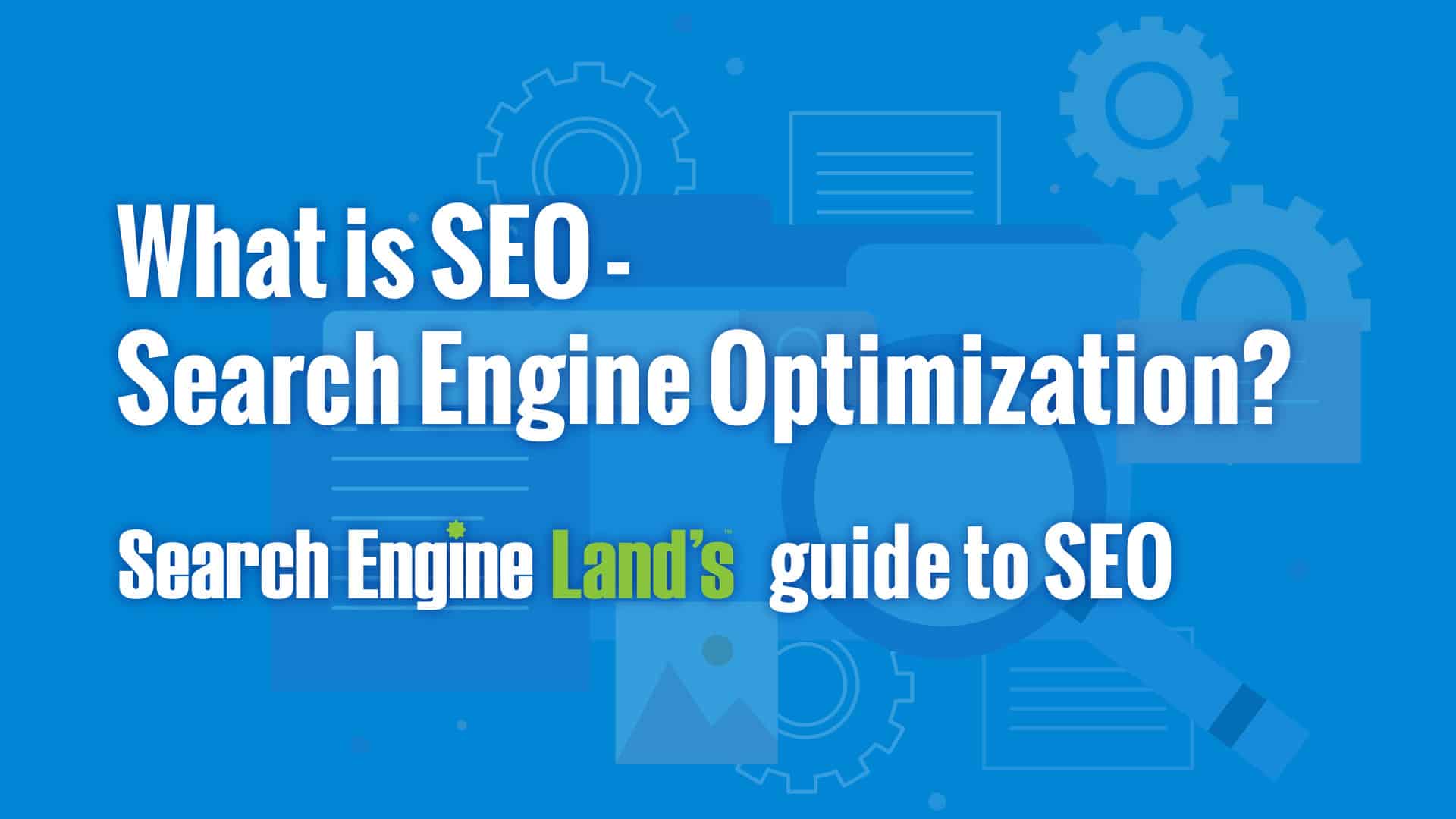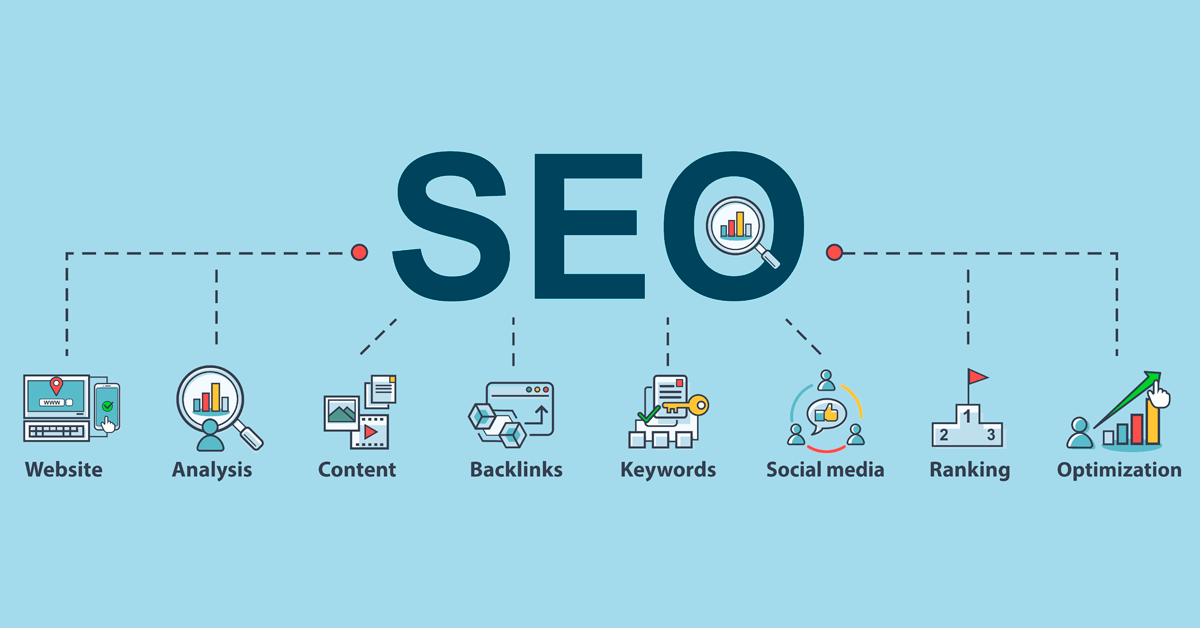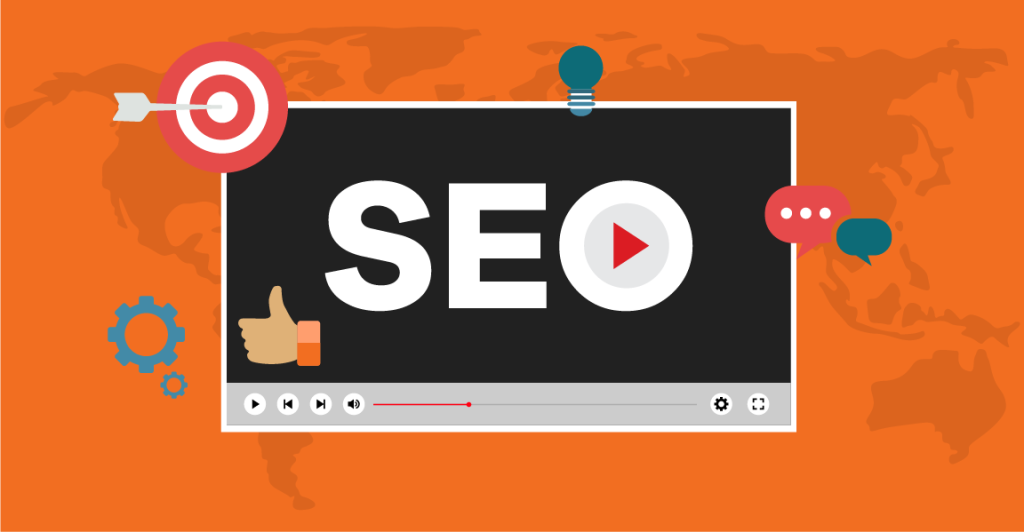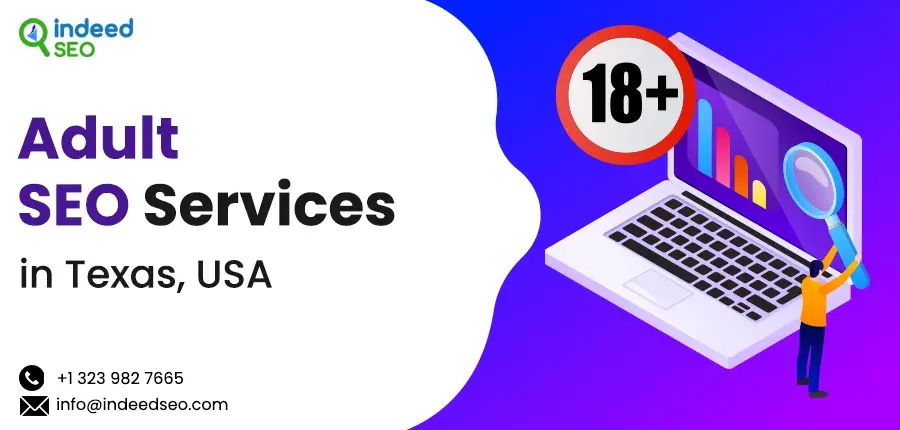SEO stands for Search Engine Optimization in business. It is a critical digital marketing strategy.
In the rapidly evolving online marketplace, businesses leverage SEO to improve their visibility in search engine results pages (SERPs). An effective SEO strategy can significantly increase organic traffic, leading to enhanced user engagement and higher conversion rates. By optimizing website content with relevant keywords, maintaining a user-friendly site structure, and ensuring fast loading speeds, companies aim to rank higher on search engines like Google.
This digital prowess is not just about attracting visitors; it’s about drawing in the right audience and converting their interest into action. SEO is essential for businesses looking to establish a robust online presence and stay competitive in the digital realm.

Credit: searchengineland.com
Introduction To Seo In Business
Introduction to SEO in Business is crucial today. Every business needs to understand it. SEO stands for Search Engine Optimization. It helps websites rank higher on search engines. This means more people see the website. For businesses, this is very important.
The Role Of Seo In Modern Enterprises
SEO changes how businesses reach their customers. It makes sure businesses show up online. This is important because everyone uses the internet now. SEO helps businesses be seen by more people.
- Improves website visibility
- Increases customer engagement
- Boosts brand awareness
How Seo Fuels Business Growth
SEO drives growth by bringing more traffic to websites. More traffic means more potential customers. This can lead to more sales. SEO also helps businesses understand their customers better through data.
| SEO Factor | Impact on Business |
|---|---|
| Website Traffic | Increases potential customer base |
| Customer Insights | Improves product/service offerings |
| Brand Visibility | Builds trust and authority |
Seo Fundamentals
SEO stands for Search Engine Optimization. It’s vital for business success online. SEO helps websites rank higher in search results. This brings more visitors to your site. Let’s explore the key components and the impact of search algorithms on SEO.
Key Components Of Seo
Several factors contribute to a strong SEO strategy. These elements work together to boost your website’s visibility.
- Keywords: These are words or phrases people use in searches. Your content should include these keywords.
- Content Quality: High-quality, relevant content engages readers. Google rewards valuable information.
- Backlinks: These are links from other sites to yours. They show your content’s credibility.
- User Experience (UX): A site easy to navigate keeps visitors longer. A good UX improves rankings.
- Page Speed: Fast-loading pages retain visitors. Google uses speed in its ranking algorithm.
- Mobile Friendliness: Your site must work well on mobile devices. Most people use phones for browsing.
Search Algorithms And Their Impact On Seo
Search engines use complex algorithms to rank websites. These algorithms change frequently. Staying updated is crucial.
| Algorithm | Purpose | Impact on SEO |
|---|---|---|
| Google Panda | Penalizes poor content | Encourages quality content creation |
| Google Penguin | Targets spammy links | Discourages link schemes |
| Google Hummingbird | Improves keyword context | Promotes natural language queries |
| Google Mobilegeddon | Boosts mobile-friendly pages | Pushes for mobile optimization |
Businesses must adapt to these changes. Adapting helps maintain or improve rankings. This leads to more traffic and potential customers.
Strategic Keywords And Business
SEO stands for Search Engine Optimization in business. It helps websites rank higher in search results. Strategic keywords are essential for any business looking to enhance its online presence. These keywords align with business goals and target audience searches. They drive relevant traffic to your website, increasing visibility and potential revenue.
Researching The Right Keywords
Keyword research is the foundation of SEO. It involves identifying terms that potential customers use to search for products or services. Businesses must select keywords relevant to their offerings. They must also consider the search volume and keyword difficulty. Tools like Google Keyword Planner can help in this process.
- Identify your target audience.
- Understand their search habits.
- Use keyword research tools.
- Focus on long-tail keywords for specific searches.
Keywords In Competitive Business Niches
In competitive niches, the right keywords can make a big difference. Businesses must find a balance between high-traffic keywords and those with less competition. Long-tail keywords often offer this balance. They target specific queries and attract high-quality traffic.
| Keyword Type | Benefits |
|---|---|
| High-Traffic Keywords | More visibility but higher competition |
| Niche-Specific Keywords | Less traffic but highly relevant |
| Long-Tail Keywords | Specific and less competitive |
Use tools to analyze keyword effectiveness. Track your rankings and adjust your strategy accordingly. Remember, SEO is an ongoing process. It requires constant monitoring and updating to stay ahead in the game.

Credit: thekoolsource.net
Content Creation For Seo
When it comes to SEO in business, content is king. Great content boosts your website’s visibility. It also engages and retains customers. Crafting SEO-friendly content is not just about stuffing keywords. It’s about delivering value to your readers. Let’s explore how to create content that both your audience and search engines will love.
Crafting Content That Ranks
Writing top-notch content starts with understanding SEO. You need to know what your audience searches for. This involves keyword research. Find the right keywords. Then, weave them into your content naturally. Your titles should be catchy. Meta descriptions need to be compelling. Always aim for content that answers questions. This will satisfy user intent and search engines.
Balancing Quality And Seo In Content
Never compromise quality for SEO. Both are crucial. Write clear, concise content. Use short sentences. Break text into small paragraphs. Bold your main points. Add lists where relevant. This makes content easy to read. Google loves content that readers find useful. So, focus on providing value. High-quality content gets shared. This increases your site’s authority and ranking.
Remember, SEO-friendly content is a mix of art and science. With the right strategy, your content can reach the top of search results. Start with a solid plan. Keep your audience in mind. Stay true to your brand voice. With consistent effort, your content will shine in the crowded digital space.
On-page Optimization Techniques
On-Page Optimization Techniques play a crucial role in SEO success. These methods ensure that websites meet search engine standards for high rankings. They involve adjustments to various elements of a webpage. This leads to better visibility and traffic. Let’s dive into how you can optimize your pages for search engines.
The Anatomy Of An Optimized Page
An optimized page has several key components. Each one contributes to the page’s SEO strength. Below are the essentials:
- Title Tag: This is the headline that appears in search results. It should be concise and include the main keyword.
- Meta Description: A brief page summary that appears under the title tag in search results. It should also contain the primary keyword.
- Header Tags: These are headings and subheadings within your content. They help organize the page and highlight important topics.
- URL Structure: A clean URL with keywords improves page optimization.
- Alt Text for Images: Descriptive alt text helps search engines understand images. It also makes your site more accessible.
- Keyword Frequency: Use keywords throughout the content. But keep it natural and avoid keyword stuffing.
- Internal Linking: Link to other relevant pages on your site to keep visitors engaged.
User Experience And On-page Seo
User experience (UX) is key to keeping visitors on your site. Good UX leads to longer visits and more interactions. Here’s how UX impacts on-page SEO:
| UX Factor | SEO Benefit |
|---|---|
| Site Speed | Fast loading times reduce bounce rates. |
| Mobile Responsiveness | Adapts to any device, crucial for mobile SEO. |
| Easy Navigation | Helps users find information quickly. |
| Clear Calls to Action | Guides users to the next steps. |
| Engaging Content | Keeps users interested and on your site longer. |
By focusing on these factors, you create a win-win situation. Your site climbs in search rankings. Visitors enjoy their experience and engage more with your content.
Off-page Seo And Link Building
Let’s dive into the world of Off-Page SEO and Link Building. This part plays a big role in how well your site ranks on search engines. It’s all about what happens outside your site. It includes getting other websites to link back to you. These are known as backlinks. Let’s explore why they matter and how to get them the right way.
Importance Of Backlinks
Backlinks are like votes for your website. They tell search engines your site is valuable. The more quality backlinks you have, the higher you rank. But, not all backlinks are good. You want links from reputable sites. These boost your site’s trust and authority.
- Boosts site authority: Links from strong sites help a lot.
- Improves ranking: Good backlinks push your site up in search results.
- Increases traffic: More visibility means more visitors.
Ethical Link Building Strategies
Building good backlinks takes work. You must use ethical ways. This means no buying links or using shady tactics. Here are some smart ways to build backlinks:
- Create awesome content: People link to valuable information.
- Guest blogging: Write for other sites and include your link.
- Broken link method: Replace dead links on websites with yours.
Remember, quality over quantity always wins in link building. Aim for links from sites related to your niche. This makes your backlinks more powerful.
Technical Seo For Business Websites
Technical SEO for Business Websites is a crucial piece of the SEO puzzle. It ensures that search engines can crawl, interpret, and index your website effectively. This is vital for businesses aiming to be visible in search engine results. In the next sections, we’ll explore key aspects of Technical SEO that every business website needs to get right.
Website Structure And Indexability
A well-organized website structure helps search engines understand your site. Clear hierarchy and simple navigation are key. Use
Robots.txt files tell search engines what to crawl. Use these wisely to improve your site’s indexability. Ensure all important pages are accessible and none are unintentionally blocked.
Mobile Optimization And Speed
Mobile optimization is essential as more users browse on their phones. Sites should adapt to different screen sizes. Use responsive design techniques to achieve this. Fast-loading pages also keep users engaged. Employ compression tools to shrink file sizes. Optimize images and use lazy loading to boost speed.
Google’s PageSpeed Insights tool can help you check your site’s speed. Aim for a high score to ensure a better user experience. This can lead to higher rankings in search results.
Remember, a technically sound website lays the foundation for a successful online presence. Start with these steps to set your business up for SEO success.
Local Seo And Small Business
Local SEO boosts visibility for small businesses. It targets regional audiences. It’s vital for success.
Capturing Local Markets
Local SEO connects businesses with nearby customers. It uses location-based keywords. Customers find services easily.
- Optimize for “near me” searches.
- Target local keywords in content.
- Use local landmarks in metadata.
Small businesses gain from tailored strategies. They attract foot traffic and online visits. Local prominence increases.
Managing Online Business Listings And Reviews
Accurate listings are essential. They guide customers to the right place. Reviews build trust and credibility.
Keep business information updated. This includes hours, address, and contact. Respond to reviews promptly.
| Task | Benefit |
|---|---|
| Update Google My Business | Improves Google rankings |
| Monitor Yelp and similar sites | Enhances reputation |
Measuring Seo Success
Understanding the impact of SEO on your business is crucial. It shows if your strategies work. Knowing how to measure SEO success helps you make better decisions. Let’s dive into the metrics and tools that can help you track your SEO performance.
Seo Metrics And Kpis
SEO metrics and KPIs are your scorecards. They tell you where you stand in search rankings. Look at these important metrics:
- Organic Traffic: Number of visitors from search engines.
- Bounce Rate: Percentage of visitors who leave quickly.
- Conversion Rate: Percentage of visitors who take action.
- Keyword Rankings: Positions for targeted keywords.
- Page Load Time: How fast your site loads.
- Backlinks: Links from other sites to yours.
Set clear goals. Use these metrics to see if you meet them. They show your SEO’s health.
Tools For Tracking Seo Performance
Tools make tracking SEO easier. They give detailed reports and insights. Here are top tools:
| Tool | Use |
|---|---|
| Google Analytics | Tracks visitor data and behavior. |
| Google Search Console | Monitors search performance. |
| Ahrefs | Researches keywords and backlinks. |
| SEMrush | Provides competitor insights. |
| Moz Pro | Offers SEO improvement tips. |
Pick the right tools. They help you track your progress and tweak your strategy.
Future Of Seo In Business
The future of SEO in business is bright and dynamic. As the digital landscape evolves, businesses must adapt to stay ahead. SEO is no longer just about keywords and backlinks. It’s about creating a seamless user experience and staying ahead of algorithm changes. Let’s dive into what the future holds for SEO in business.
Emerging Trends In Seo
The world of SEO is always changing. Here are key trends:
- Voice Search: More people use voice commands to search online.
- AI and Machine Learning: These technologies help create smarter SEO strategies.
- Mobile-First Indexing: Websites must work well on phones.
- User Experience (UX): Sites must be easy and fun to use.
Preparing For Algorithm Changes
Google updates its algorithm often. Here’s how to prepare:
- Stay informed about SEO news and updates.
- Focus on creating quality content that answers users’ questions.
- Make sure your website is fast and mobile-friendly.
- Use data and analytics to understand your audience better.
By keeping these points in mind, businesses can stay ahead in the SEO game.

Credit: www.constantcontact.com
Frequently Asked Questions
What Does Seo Marketing Mean?
SEO marketing is the practice of optimizing website content to increase visibility in search engine results, thereby attracting more organic traffic.
What Is Seo For Your Business?
SEO for your business enhances your online visibility, driving more organic traffic to your website through higher search engine rankings. It targets specific keywords to attract your ideal audience.
What Is An Example Of Seo?
An example of SEO is optimizing a webpage with relevant keywords to rank higher in search engine results. This involves crafting meta descriptions, using strategic keywords in content, and ensuring the site is mobile-friendly to improve visibility and drive organic traffic.
What Is The Meaning Of Seo In Business Position?
SEO in a business context refers to optimizing a company’s online content to boost its visibility in search engine results, attracting more potential customers.
Conclusion
Understanding SEO’s role in business is pivotal for any company’s success. It enhances visibility, drives traffic, and boosts sales. By focusing on effective SEO strategies, businesses can significantly improve their online presence. Remember, SEO is not just a buzzword; it’s a crucial investment in your brand’s digital future.
Embrace it to stay ahead in the competitive market.

